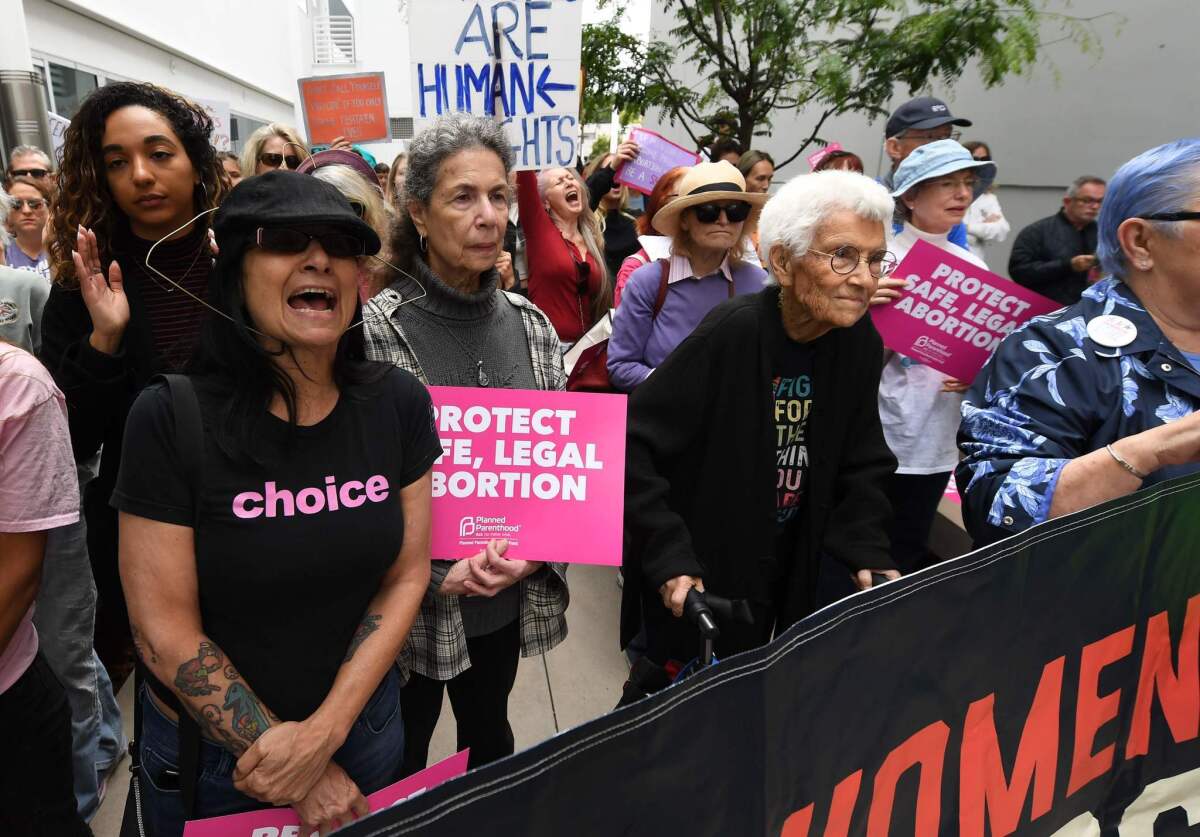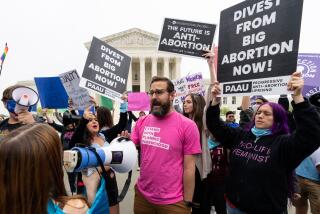Column: Bucking federal policy, California court blocks church attack on abortion coverage

An effort by a Catholic mission to narrow the accessibility of abortion insurance coverage in California has been dealt a blow by a state appeals court, which has ruled that abortion must be covered by health plans sold in the state.
A three-judge panel of the state Court of Appeal threw out the case brought by the Missionary Guadalupanas of the Holy Spirit, which claimed that it was forced to participate in a “grave moral offense” by a state regulation mandating that all insurance policies provide abortion coverage.
The mission’s own members “presumably...would never have an abortion,” the judges ruled. But the mission “objects to other plan participants being allowed to have abortion coverage.”
An abortion procedure is both a recognized treatment for the medical condition of a patient’s pregnancy and a treatment every woman in California has a legal right to choose.
— California Court of Appeal
The mission’s argument, the court observed, was that others’ abortion coverage would be subsidized by its own members’ premiums, which the members consider “morally, ethically, and religiously unacceptable.”
The judges found that argument to be a bridge too far. The mission “attempts to limit coverage of most abortions by health care service plans in California,” they noted. That would violate the state Constitution and state law, which guarantee the right to abortion.
With minimal fanfare, California state officials have nixed an underhanded effort by two Catholic-affiliated universities and their insurers to deprive the universities’ employees of insurance coverage for abortions.
“That’s very important in state law,” Beth Parker, general counsel to Planned Parenthood of Northern California, told me. “Extending it to health plans is an important principle.”
What’s also important is that the ruling upholds state law that is very much at odds with the winds of change in women’s reproductive health rights in several Midwestern and Southern states and at the federal level. Abortion rights have been systematically narrowed by legislatures in those states.
Meanwhile, the Trump administration has been trying to expand the authority of employers to deny women coverage for abortion and contraception services on religious or “moral” grounds.
The ruling is “really important now in context of what’s happening in the rest of the country,” Parker says. “We anticipate that women may be coming here to obtain abortions” because their options have been closed off in other states.
This shouldn’t come as a surprise, since it’s a relationship that’s been known for years, but the states with the harshest restrictions on abortions also have the worst infant mortality rates.
The mission is based in Mexico but maintains a provincial headquarters in Los Angeles. The mission referred my questions about the ruling to its attorney, Stephen Greene of Sacramento, who hasn’t replied to my inquiry. The ruling, which was handed down Aug. 6 in the appellate court’s 3rd District but published Wednesday, was written by Justice Cole Blease and concurred in by Justice Harry E. Hull Jr. and Presiding Justice Vance Raye.
The immediate issue before the court was whether the state Department of Managed Health Care had violated administrative law in 2014 when it ordered seven health insurers by letter to include abortion services in their plans. (The court ruled that the administrative law didn’t apply.) But the legal principle at stake is much broader.
The case has its origins in that 2014 letter. The department was responding to the discovery that two health insurers -- Kaiser Permanente and Anthem Blue Cross -- had created special insurance plans for Jesuit-affiliated Loyola Marymount University and Santa Clara University lacking abortion coverage.
Bowing to pressure from the anti-abortion lobby, the Trump administration said Wednesday that it will end a contract with the University of California that used human fetal tissue to research treatments for infectious diseases such as HIV and the Zika virus.
Anthem quietly had obtained approval from the the Managed Health Care Department in 2008 to make the change, and Kaiser Permanente acknowledged that it had won approval in 2012 “to market a plan excluding abortions deemed not ‘medically necessary’” even to non-Catholic clients.
The effort became public only after Loyola Marymount started implementing the changes in 2013. The dropping of abortion coverage created an uproar among faculty on the Los Angeles campus, not least because of the vagueness of the provision’s language: Coverage was to remain in place only for “therapeutic” abortions, a term that ostensibly meant those deemed medically necessary.
The changes also drove a wedge between the faculty and administration at Santa Clara.
The 2014 letter informed insurers that the previous approvals had been made in error, and ordered Kaiser and Anthem to roll them back. The agency also forbid insurers to distinguish between coverage for “voluntary” or “elective” abortions -- to which the universities objected -- and “therapeutic” abortions, which are those deemed by the universities and their health plans to be medically necessary to protect the life of the mother.
What does it take to force the Trump administration to back off from a manifestly irresponsible and ill-considered policy?
California law doesn’t recognize the terms “medically necessary,” “elective” or “voluntary” as they apply to abortions, the letter observes. The only abortions performed by a medical professional that are outlawed in California, and thus not eligible for insurance coverage, are those performed after a fetus is viable.
The appellate court endorsed the department’s view. “Nothing in the statute or the regulation limits medically necessary services to those required to save the patient’s life, nor can we imagine that is what the Legislature intended,” the court ruled; every legal abortion is deemed “medically necessary” under the law.
Pregnant women have two legal choices in California: to carry the pregnancy to term or to terminate it, typically by abortion, the court said. “An abortion procedure is both a recognized treatment for the medical condition of a patient’s pregnancy,” the court observed, “and a treatment every woman in California has a legal right to choose.”
More to Read
Inside the business of entertainment
The Wide Shot brings you news, analysis and insights on everything from streaming wars to production — and what it all means for the future.
You may occasionally receive promotional content from the Los Angeles Times.














